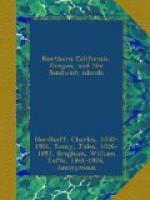Of a total native population of 51,531, 6580 are returned by the census as freeholders—more than one in every eight. Only 4772 are returned as plantation laborers, and of these probably a third are Chinese; 2115 returned themselves as mechanics, which is a very large proportion of the total able-bodied population. I believe that both freeholders and mechanics find employment on the plantations as occasional laborers.
A people so circumstanced, well taught in schools, freeholders to a large extent, living in a mild and salubrious climate, and with cheap and proper food, ought not, one would say, to decrease. There are, of course, several reasons for their very rapid decrease, and all of them come from contact with the whites. These brought among them diseases which have corrupted their blood, and made them infertile and of poor stamina. But to this, which is the chief cause, must be added, I suspect, another less generally acknowledged.
The deleterious habit of wearing clothes has, I do not doubt, done much to kill off the Hawaiian people. If you think for a moment, you will see that to adopt civilized habits was for them to make a prodigious change in their ways of life. Formerly the maro and the slight covering of the tapa alone shielded them from the sun and rain. Their bodies became hardy by exposure. Their employments—fishing, taro-planting, tapa-making, bird-catching, canoe-making—were all laborious, and pursued out-of-doors. Their grass houses, with openings for doors and windows, were, at any rate, tolerably well ventilated. Take the man accustomed thus to live, and put shoes on his feet, a hat on his head, a shirt on his back, and trowsers about his legs, and lodge him in a house with close-shutting doors and windows, and you expose his constitution to a very serious strain, especially in a country where there is a good deal of rain. Being, after all, but half civilized, he will probably sleep in a wet shirt, or cumber his feet with wet shoes; he will most likely neglect to open his windows at night, and poison himself and his family with bad air, to the influence of which, besides, his unaccustomed lungs will be peculiarly liable; he will live a less active life under his changed conditions; and altogether the poor fellow must have an uncommonly fine constitution to resist it all and escape with his life. At the best, his system will be relaxed, his power of resistance will be lessened, his chances of recovery will be diminished in the same degree as his chances of falling ill are increased. If now you throw in some special disease, corrupting the blood, and transmitted with fatal certainty to the progeny, the wonder is that a people so situated have not died out in a single generation.




